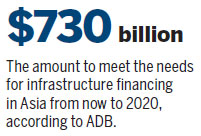For the past week or so, a growing number of US allies in Europe, from Britain to Germany to Italy and Luxembourg chose to defy Washington's warning of staying away from the Asia Infrastructure Investment Bank (AIIB), first initiated by China in 2013.
The European nations plus many Asian nations not only have seen the huge business opportunities in the most dynamic region of the world's economy, they also believe that being part of the bank, by joining as founding members by the March 31 deadline, is a better way to help the bank operate with high standards.
The move by European nations, which are experienced in the banking industry, has been warmly welcomed by China and many others.

Christine Lagarde, managing director of the International Monetary Fund (IMF), said on Sunday that the fund would be delighted to cooperate with the AIIB, noting that there was massive room for IMF cooperation with the AIIB on infrastructure finance.
World Bank President Jim Yong Kim expressed the same view earlier. He regards the AIIB as complementary, rather than a rival of the World Bank.
China has repeatedly said that the AIIB will uphold high standards and learn from the best practices from the existing multilateral financing institutions. China also has reiterated that the AIIB will serve the vast needs for infrastructure financing, not for any geopolitical purpose, as some have speculated.
It also stated that AIIB will be complementary to institutions such as the World Bank and Asian Development Bank.
According to ADB, the needs for infrastructure financing in Asia will reach $730 billion from now to 2020, which the ADB and World Bank alone cannot fill.
ADB President Takehiko Nakao said earlier that the bank will explore potential cooperation with AIIB. Nakao was sitting next to Chinese Finance Minister Lou Jiwei in Beijing on Sunday at the China Development Forum 2015, a sign that could be seen as ADB's support for AIIB.
Australia, South Korea and even Japan are considering joining AIIB as founding members, with a decision by Australia likely on Monday when its cabinet meets. All three have been facing great pressure from Washington not to join. But China, rather than the US, is the largest trading partner for all three. Not being part of such a needed financial institution in their own neighborhood does not make sense.
Despite the changing landscape, Washington still sticks to its rhetoric, insisting that it recognizes the huge need for infrastructure financing in the region and that it does not oppose the bank but is concerned whether it will uphold high standards, such as on transparency, labor, the environment and corruption, all of which Beijing has clarified.
US officials from Secretary of Treasury Jack Lew to Export-Import Bank of the United States President Fred Hochberg to State Department spokesman Jeff Rathke repeated Washington's old talking points in the past week.
Jin Liqun, secretary general of the interim secretariat of the AIIB, also proclaimed China's stance again in detail on Sunday at the development forum in Beijing, a message directed at Washington's concerns.
Many US experts believe that Washington's view is a result of the fact that the US will not be able to join AIIB anyway given the potential strong opposition from the Republican-controlled Congress.
The US Congress' opposition to endorsing the IMF reform, which would give emerging economies a bigger say, has angered not only the IMF and almost every other IMF member nation that has approved the reform, but also the Obama administration.
"It's not an accident that emerging economies are looking at other places because they are frustrated that, frankly, the United States has stalled a very mild and reasonable set of reforms in the IMF," Lew told US lawmakers last week in a testimony.
Many experts also believe that Washington's opposition to the AIIB is because it will not join any institution led by China instead of the US. Washington still sees every move by China from a geopolitical viewpoint, a legacy from the Cold War. That contradicts what the US government has advocated publicly: a greater role and responsibility for China in global affairs.
 The Obama administration has been criticized for its handling of AIIB from early on.
The Obama administration has been criticized for its handling of AIIB from early on.
Robert Zoellick, the former World Bank president, US trade representative and deputy secretary of state, was quoted in The Wall Street Journal last week that Obama's approach is "mistaken both on policy and on execution".
"If I had been at the World Bank, I would have tried to embrace the AIIB as a partner," Zoellick said.
The actions taken by US allies in Europe and Asia might be seen as a signal that they are no longer Washington's poodles when it doesn't make sense to them.
Contact the writer at chenweihua@chinadailyusa.com